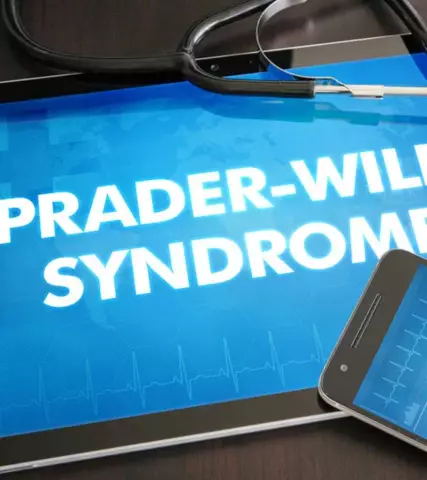- Author Rachel Wainwright wainwright@abchealthonline.com.
- Public 2023-12-15 07:39.
- Last modified 2025-11-02 20:14.
Prader-Willi syndrome

Prader-Willi syndrome in medicine is a rare hereditary disease characterized by the absence or insufficient functioning of some genes or their parts of the 15th paternal chromosome. For the first time, this pathology was described in 1956 in Switzerland by pediatricians A. Prader and H. Willi, by whose names the syndrome was named. Its frequency is 1 case per 12-15,000 newborns. Symptoms and manifestations of Prader-Willi syndrome are different, and the course of the disease depends, as a rule, on a specific case.
Signs of Prader-Willi syndrome
Some signs of Prader-Willi syndrome can be detected even during pregnancy. First of all, this is the low mobility of the fetus and its incorrect position. After birth, muscle hypotonia is expressed, which persists throughout the first year of the baby's life. In addition, children with the syndrome show a decrease in swallowing and sucking reflexes, which complicates the feeding process. Impaired development of motor functions in them is also due to muscle hypotonia, so sick children find it difficult to sit, hold their head, etc. However, it is important to note that hypotension decreases and practically disappears by the age of 6-7 years.
Prader-Willi syndrome in children is also manifested by constant hunger and lack of satiety. This symptom of the disease usually occurs in the second or fourth year of a child's life. Against this background, hyperphagia or gluttony, obsessive thoughts about food and obsessive behavior, which is aimed at continuous searches for food and satisfaction of hunger, gradually develop. Such symptoms inevitably lead to obesity, which in the case of this disease is observed mainly on the trunk and proximal extremities. These signs of Prader-Willi syndrome in children often lead to complications such as obstructive apnea, which is manifested by respiratory arrest during sleep.
Other typical symptoms of the disease are:
- Decreased growth;
- Elongated head shape;
- Almond-shaped eye section;
- Wide nose bridge;
- Thin upper lip and small mouth;
- Low set auricles;
- Acromicria (disproportionately small hands and feet);
- Weak pigmentation of the skin, iris and hair, which is observed in 75% of cases of the disease;
- Dysplasia of the hip joints;
- Rachiocampsis;
- Decreased bone density;
- Increased sleepiness;
- Strabismus (strabismus);
- Thick saliva and dental problems;
- Late puberty.
Already at birth, Prader-Willi syndrome in children is manifested by a violation of the development of the genital organs. In boys with this disease, underdevelopment of the penis and scrotum is observed, and the level of testosterone is sharply reduced, in girls, underdevelopment of the labia and often the uterus. In the future, the disease leads to the absence or delay of puberty and infertility.
One of the main signs of Prader-Willi syndrome is also delayed psychomotor development. The coefficient of intellectual development in patients is 20-80 units, while the norm is 85-115 units. Along with this, children suffering from this disease, as a rule, have good visual memory, can learn to read and even have a fairly rich passive vocabulary, but their speech is much worse than understanding.
Prader-Willi syndrome in children is usually accompanied by poor auditory and visual memory, mathematical and writing skills are very difficult for them. It should be noted that it is not uncommon for children with this syndrome to develop diabetes mellitus.
Diagnostics of the Prader-Willi syndrome
Early diagnosis of Prader-Willi syndrome and subsequent treatment can improve the prognosis of the disease. The diagnosis is usually made on the basis of the clinical manifestations of the disease, but today genetic testing is often used, which experts recommend primarily for newborns. This is due to the fact that it is much more difficult to determine the presence of the syndrome in children, since it is impossible to test their ability to diagnose Prader-Willi syndrome by clinical manifestations.
Genetic testing is carried out by the method of DNA methylation in order to find out if there are abnormalities on chromosome 15 that lead to the onset of the disease. This method of diagnosing Prader-Willi syndrome helps to identify 97% of cases of the disease.
It is also worth noting that the disease is often misdiagnosed as it is often confused with Down syndrome, which is much more common. In addition, obesity, a characteristic feature of Prader-Willi syndrome, can also be present in Down syndrome. For this reason, a huge number of cases remain undetected.
Treatment of Prader-Willi syndrome

Since the disease is a genetic abnormality, there are currently no effective drugs for treating Prader-Willi syndrome. Along with this, some therapeutic measures are used to help improve the quality of life of patients. First of all, they should be aimed at increasing muscle tone, so sick children need special massage procedures and physiotherapy.
Treatment for Prader-Willi syndrome also includes a diet that is low in fat and carbohydrates. To avoid obesity, you need to constantly monitor the quality and calorie intake of food. In addition, the use of hormonal therapy with the help of gonadotropins is often recommended during treatment, which can increase the growth of a sick child and restore muscle tone. This contributes to the correct distribution of calories in the body, preventing obesity.
Treatment of Prader-Willi syndrome also involves special methods for the development of sick children, classes with a defectologist, speech therapist and psychologist.
YouTube video related to the article:
The information is generalized and provided for informational purposes only. At the first sign of illness, see your doctor. Self-medication is hazardous to health!






